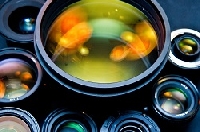
Camera lenses an amateur photographer needs
It would be great if the question of how many lenses an amateur photographer needs could be just simply answered with a number accompanied by a direct reason. However, there is a lot of discussion between photographers, both professional and amateur, of just how many lenses (or “glass”) are actually required.
An amateur photographer could really get away with having just one lens – but more would need to be acquired for different types of photography and experimentation. Plus quality has to be a factor; better to buy one good-quality lens rather than lots of mediocre ones.
One Lens
Taking into account factors such as budget, level of interest and field of photography (a sports photographer would need different lenses than a wedding photographer), then an amateur photographer can actually manage with just one lens! But which one?
A good choice is a 24-70 mm lens. This is a good all-round type of lens which is useful for portraits and candid photography. The choice in this range is vast as well. Professional lenses in the 24-70 mm category can cost thousands of dollars, but it is possible to buy much cheaper refurbished lenses that will still suit your purpose.
Lens Tip
When purchasing a decent DSLR (Digital Single-Lens Reflex) camera look out for one that comes with a kit lens. You can find famous camera brands (Nikon, Canon, etc.) that offer a package of a camera, case and two lenses for a few hundred dollars. This could comprise of the common 18-55 mm lens and a telephoto zoom lens of 55-200 mm or 75-300 mm.
~
Lens Fact
The famous French photographer, Henri Cartier-Bresson, mostly used just one lens – a 50 mm lens combined with his Leica camera.
Two Lenses
If you can stretch your budget beyond a single lens then you might want to consider what lens to use if you plan on taking close-ups. You might want to focus on nature photography, or product photography. For extreme close-up work you may even need a macro lens.
A 50 mm “normal” lens should be suitable for most amateur close-up photography that would not come under “macro” photography. 50 mm lenses are relatively common and decent ones can be picked up for relatively reasonable prices (under $200).
Three Lenses
You might want to go to sporting events and take photos of athletes that could be far away and moving quickly. Or you might want to take a photo of a bird in flight. Time to find a long telephoto zoom lens! 70-300 mm lenses are worth considering here, although if you want a fuller range it is easy to find 50-500 mm lenses.
Lens Considerations
The range of camera lenses is massive. An amateur photographer has to consider features such as focal length, image sensor, f-stop and image stabilization, and then correlate those features with cost/budget, brand name, existing equipment and field of photography. It’s a heady mix – making the question how many lenses does an amateur photographer need a complicated one to answer.
The Answer…
The answer is one lens. An amateur photographer needs to get familiar with their camera equipment, experiment and become proficient in its use. Having a camera bag full of an assortment of lenses will not turn an amateur photographer into a pro. A good all-round lens, like a 50 mm lens or the 24-70 mm zoom lens will be enough for any amateur photographer to get started with.
Of course, it is easy enough to start off with a general lens and a telephoto zoom lens by buying them as part of a camera kit. This is especially useful for those on a strict budget (hundreds rather than thousands of dollars).

